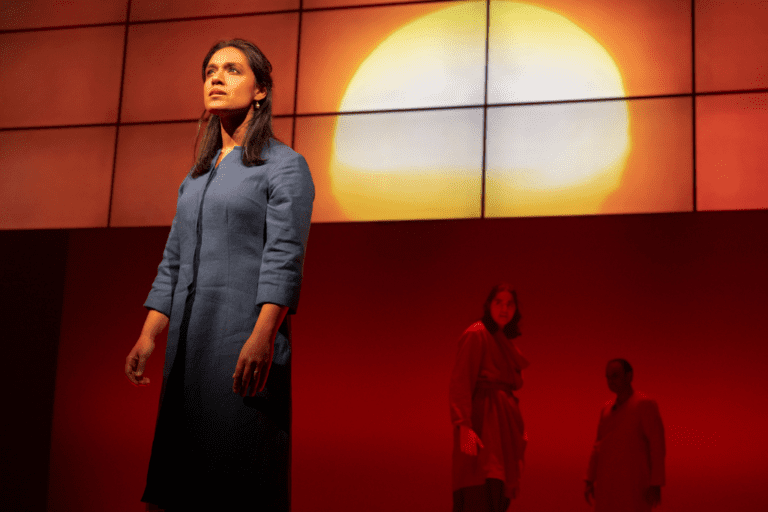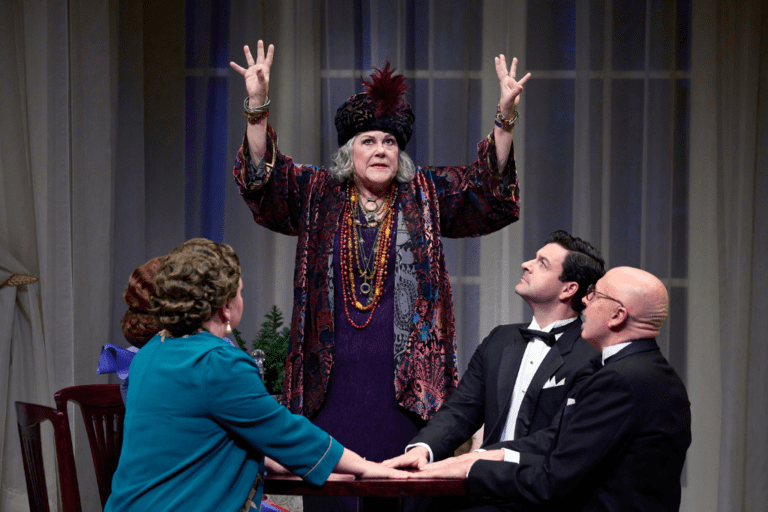With the Canadian Festival of New Musicals, Musical Stage Company shines a light on works in development
Artistic director Ray Hogg loves a metaphor.
In unpacking this year’s Canadian Festival of New Musicals, Hogg found himself at the centre of an enduring, industry-wide question: How can theatres engage new audiences without talking down to them? While thinking about the Musical Stage Company’s attempts to meet audiences where they are, Hogg turned to food.
“The audience is here,” Hogg said on a quiet afternoon in Toronto’s east end. “I keep coming back to this idea that meeting audiences where they are is not the same as pandering. Pandering is saying to my kids, ‘here are some chicken fingers,’ as opposed to ‘I made you grilled chicken and salad.’ But I know my kids like chicken. I want to stretch them a little bit, to Tuscan chicken or Moroccan or Somali chicken. I know it’s good for them, and I also want them to be fully nourished. I want them to have a sophisticated palette. I want them to understand that there’s a broad spectrum, and I want them to try the exciting part.”
It’s a fitting metaphor for the complex task of building and sustaining a loyal audience. Toronto’s musical theatre scene is more complex than the average local Broadway enthusiast might realize — outside of blockbuster Mirvish hits and touring shows, the casual Phantom of the Opera or Hamilton fan might not know where to look for soul-stirring musicals. Often, the most interesting new works are happening outside of commercial theatre companies — take the several recent new musicals at Theatre Aquarius in Hamilton, for instance, or the shows developed every year at Sheridan College.
In Toronto, Musical Stage is at least in part to thank for most of the recent fan-favourite musicals. Its co-production with Crow’s Theatre of Natasha, Pierre & The Great Comet of 1812 shattered local box office records, and it’s safe to assume that production could have extended into the early spring had it not been picked up for next year’s Mirvish subscription season. Kelly v. Kelly, too, was a local hit, and Britta Johnson’s Life After has enjoyed a life well beyond its first outing in 2016. (Just announced this morning: Life After has been programmed into the 2024-25 Off-Mirvish season!)
Looking ahead, two exciting co-productions will hit Toronto next year: Michael R. Jackson’s Tony Award-winning A Strange Loop, which will see Musical Stage join forces with Crow’s and Soulpepper, and the world premiere of Rose Napoli and Suzy Wilde’s After the Rain, which will conclude Tarragon’s 2024-25 season.
“I think our run of Comet was a really great reminder that the musical theatre stans are here,” said Hogg. “The devoted, passionate audiences are here. They exist. You know, something like 45 per cent of our audience for 2023’s Kelly v. Kelly were new. We blew our sales targets out of the water — that appetite for new musical theatre exists.”
Those looking to whet that appetite will be pleased by the lineup for this year’s Canadian Festival of New Musicals. Three musicals — In Real Life, After the Rain, and Cowboy Tempest Cabaret, written by some of Canada’s most noteworthy composers and playwrights — will be presented at the Berkeley Street Theatre at the end of May. It’s a thrilling lineup of new work, and Hogg’s eager to show these pieces off not only to audiences, but to potential producers and presenters.
“In Real Life [by Nick Green and Kevin Wong] is production-ready,” said Hogg. “It doesn’t need more development. There’s no question that it’s ready for a half-a-million-dollar production.” Part of the joy of his job, he says, is overseeing a new work at various stages of development, from its first reading through six or so workshops, until, eventually, it receives a world premiere, and perhaps even subsequent productions. Hogg was in the room during one of Come From Away’s first-ever presentations to possible producers in the early 2010s — there’s nothing more invigorating than a musical that’s entirely unique in its concept and execution, he says. (And, as someone who commissions new work, he says he’s increasingly disinterested in work that claims to be “the next Hamilton” — it’s far more rewarding to engage with original work that’s not trying to copy its predecessors.)
“I just sat in on After the Rain’s first rehearsal,” he continued, “and it’s just astonishing. All of these pieces are just astounding — these works all know who they are, and they have the right creative trams assembled. They’ve had a fair amount of development and they’re ready to be greenlit.”
While Hogg has a soft spot for what he calls “jazz hands” musicals, he believes the pandemic revealed a sharp need for intellectual nourishment.
“We’re really hungry for enrichment,” he said. “We want to feed ourselves. We’re hungry to work out the challenges and the triumphs in our life. We’ve mostly been fed entertainment, and fantasy, and I love it, you know. But it’s not all that nourishing. We’re a not-for-profit, so we have to be for something. I’m not necessarily talking about social justice work, or work that picks up the political theme of the day as a manifesto for social justice. What people need is work that speaks to what they’re going through and experiencing, and what people are trying to puzzle out. Why do I feel this way? Who am I? What am I doing with my life? These are the same questions we’ve been asking since the Greeks and the ancient Africans. Those questions are huge — and music can help answer them.”
That’s not to say it’s remotely easy producing musical theatre in Canada. Due to larger creative teams and casts, musical theatre can often be really, really expensive. But Hogg says that’s why the audience piece of the puzzle is so important: if we don’t engage the audiences who are here and hungry for new work, how can we convince well-resourced companies to take a risk on a new musical?
“We don’t have a Broadway or a West End,” he said. “There’s not a logical money-making commercial theatre destination.
“But it’s really reassuring, because on the industry side, I see my colleagues understand what we’re doing,” he continued. “We’re allowing the public to come interact with work that’s not yet finished, that’s in development. We’re telling investors, ‘please don’t let this die on the vine.’ Because we know how important this is.”
The Canadian Festival of New Musicals runs May 22-26 at the Berkeley Street Theatre. You can learn more about Musical Stage Company here.















Comments